A customer relationship management (CRM) system provides organizations with centralized business data they can use to get insights and forecast future revenue. Businesses can also use it to optimize their processes to make their teams more productive and efficient. Plus, CRMs help businesses build targeted marketing campaigns and respond faster to customers. Find out more about the benefits of CRM to your sales, marketing, and customer service operations.
Benefits of CRM Software for Sales
CRM solutions provide sales teams with centralized business data and help them create a consistent sales process. These platforms also allow them to access business data on the go and make data-based decisions. Read on for more details on the benefits of customer relationship management for sales.
1. Centralized Business Data
One of the top benefits of using CRM systems is access to a centralized platform for storing key information about deals and customer records. This saves time and increases productivity as it means you don’t have to exit apps or toggle back and forth between screens. Also, it facilitates cross-team collaboration as your sales, marketing, and customer service teams can access the same set of information from a shared database.
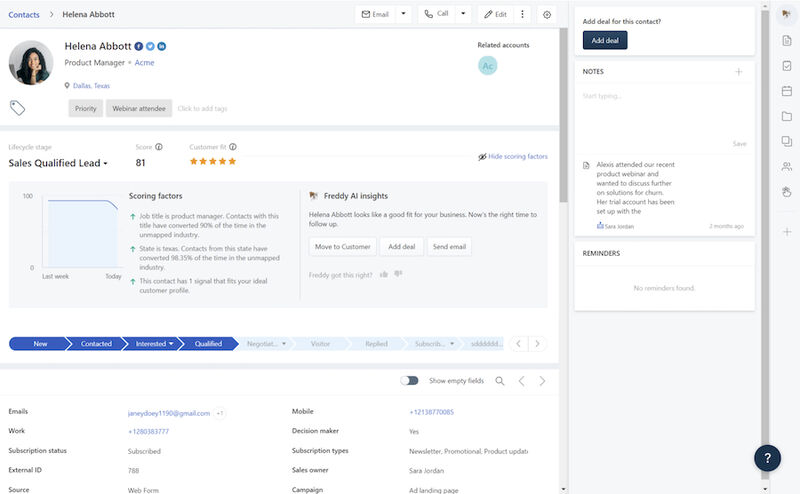
Freshsales contact profile with lead score and insights (Source: Freshsales)
2. Consistent & Scalable Sales Process
CRM software offers automation features that establish a consistent and repeatable process for your sales cycle and workflows. This helps you create a standardized sales process that allows your team to anticipate the next action in an ongoing deal.
You can also automate reminders so your sales reps are prompted to reach out to your prospects and customers at the right time. This feature is also useful in contract renewals, upselling, and launching a new product.
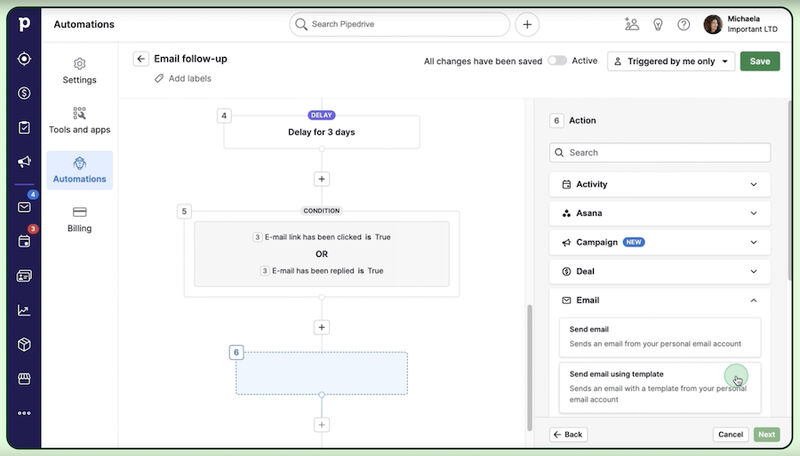
Pipedrive workflow automation (Source: Pipedrive)
3. Mobile Access to Time-sensitive Data
Most modern cloud-based CRM solutions like Zoho CRM allow you to access your data via mobile devices. This is another one of the top benefits of a CRM system. No matter where you are, you can access and modify your CRM data. Mobile CRMs are very useful for salespeople because they allow you to update deals and send proposals or contracts on the go.
Some of the best mobile CRMs—including Zoho CRM—let you make outbound calls using an in-app dialer, receive notifications on deal stage changes, and attach files directly from the app. Others integrate with online maps to help you locate a nearby prospect when you’re on your way to a sales call.
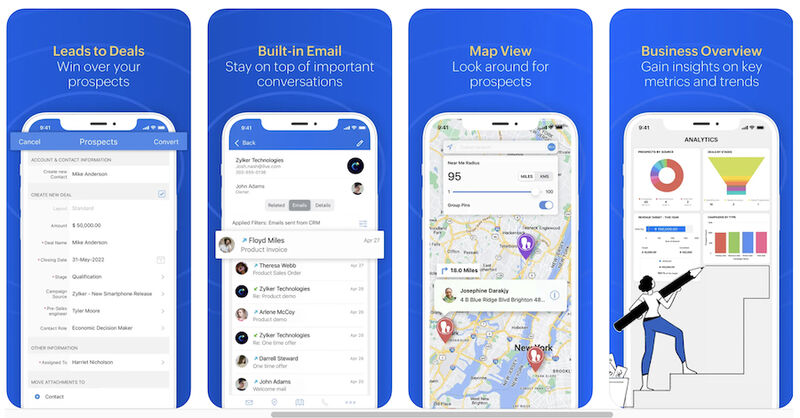
Zoho CRM mobile CRM app (Source: App Store)
4. Data-based Decision-making
CRMs store and analyze data and reports to uncover customer behavioral patterns and sales trends using sales dashboards, like the one from Salesforce seen below. You can use this information to anticipate your customers’ needs and take action at the right time. This data also tells you which sales tactics are effective or why certain deals are unsuccessful. Plus, they can help in managing individual and team performance, goals, and quotas.
For example, a sales manager sees a CRM report showing a 67% success rate in closing a deal when a proposal is sent after eight touchpoints. The same report shows that deals fall through when they don’t get in touch with a client in three days. Based on these figures, the sales manager implements specific schedules for client calls and proposals in a bid to close more deals.
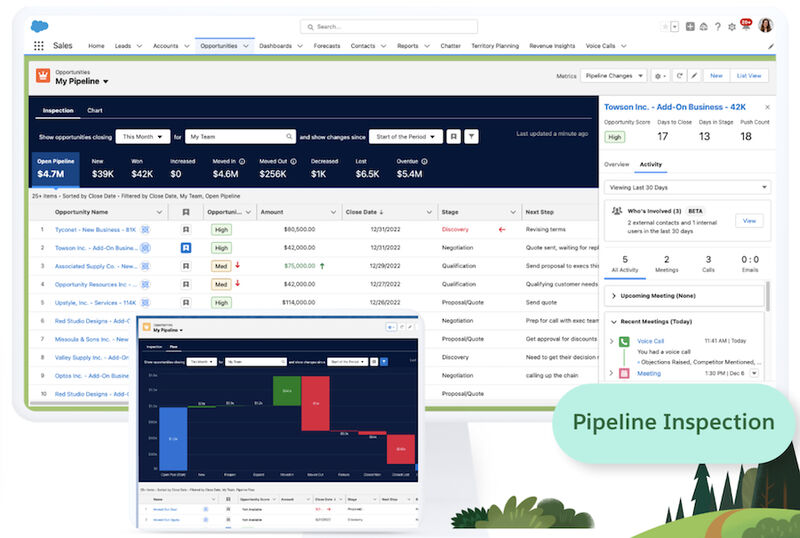
Salesforce Sales Cloud deal reports and insights (Source: G2)
Benefits of CRM Systems for Marketing
The benefits of CRM systems include the ability to send targeted marketing messages and improve customer engagement. They also help facilitate smoother interdepartmental collaboration. Find out how by reading the pros of CRM for marketing listed below.
5. Targeted Marketing Campaigns
A CRM system helps you determine the sources of your leads and prospects so you can focus on the campaigns that give you the biggest return on your investment. Based on CRM records of sales interactions, your marketing reps can gain better insight into your prospects’ interests and create more targeted and relevant content.
In addition, you can use your CRM to segment contacts based on specific criteria like location, deal stage, or lead source, as seen in the HubSpot CRM marketing analytics dashboard below. This way, your reps will be able to tailor their outreach for each contact segment and increase the chances of converting that lead into a customer.
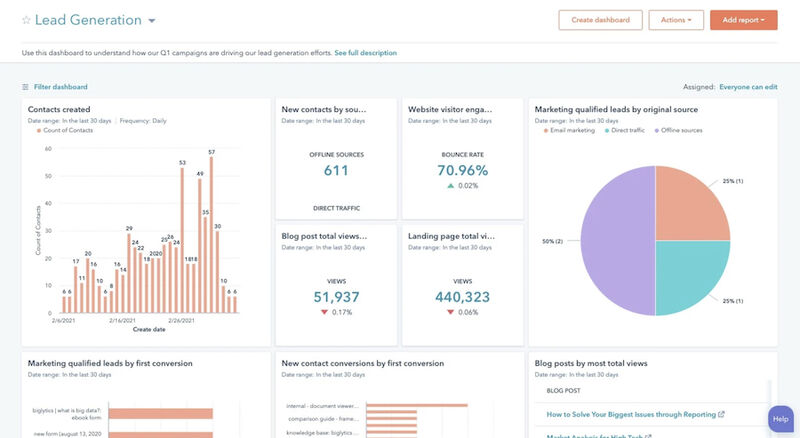
HubSpot CRM marketing analytics dashboard (Source: HubSpot)
6. Better Customer Engagement
The benefits of a CRM to marketing teams include access to a wealth of customer data that you can leverage in the relationship-nurturing process. This data can include pricing concerns, preferred communication channels, and personal interests. Marketers can use this data to create personalized campaigns, ads, and forms that help prospects move through the sales funnel and eventually become customers.
For instance, you can launch marketing campaigns that focus on what your customers want and need in order to build long-term relationships with them. This is an example of a strategy that establishes brand loyalty and helps turn your customers into advocates. At this point, they are more likely to give your product positive reviews and recommendations. Word-of-mouth referrals from your advocates are free and an excellent source of additional revenue.
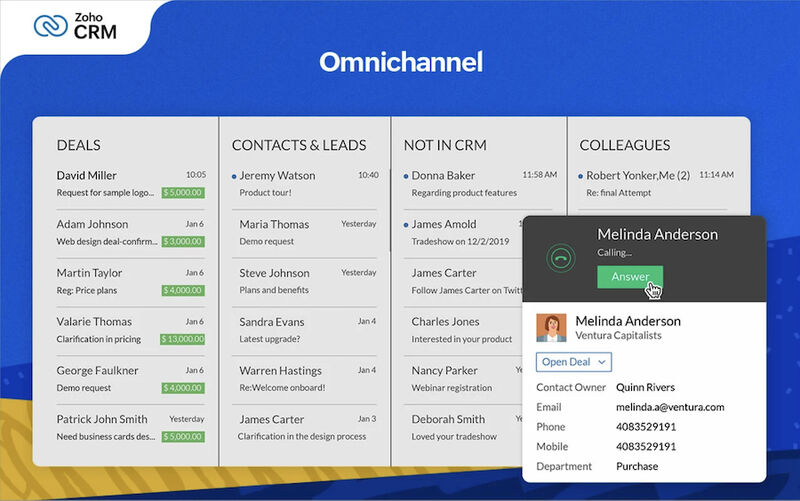
Zoho CRM omnichannel communication platform (Source: G2)
7. Simplified Collaboration
Interdepartmental communication can be a breeze with the help of a good CRM like monday CRM, which allows teams to tag reps and managers on relevant deals or tasks. Sales leaders can also use this system to assign leads or deals with just a single click. This way, marketing reps don’t need to send emails or open a separate communication system just to discuss updates on sales processes with teammates or to collaborate with the sales team.
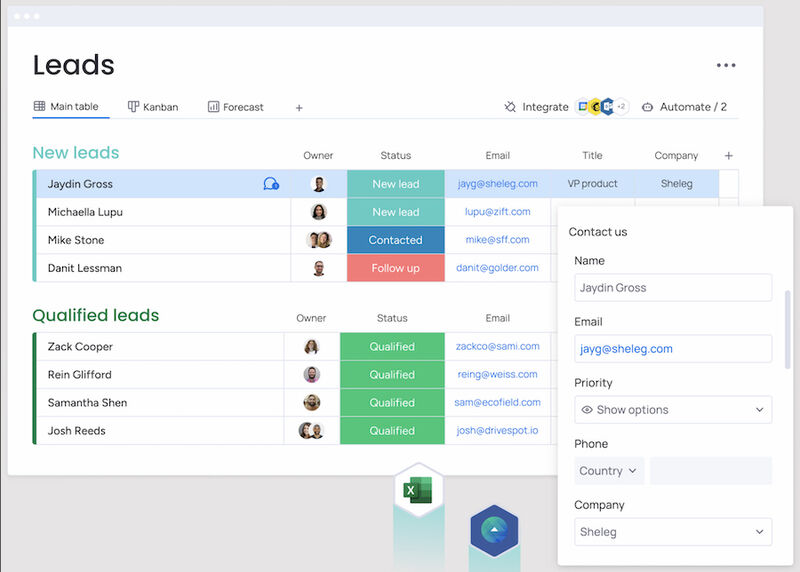
monday CRM lead management board (Source: monday CRM)
Benefits of CRM Systems for Customer Service
With the help of a CRM platform, customer service teams can have access to consolidated customer communication history. It can also help businesses personalize customer service, respond faster to customer queries, and retain more customers. Learn more about the CRM system benefits for small business customer service in the section below.
8. Consolidated Customer Communication History
Aside from storing email exchanges and phone call logs, CRM systems also save online chats related to customer support. Your support reps can scan saved chats and even send a summary of the conversation to customers once a service request has been accomplished. This creates a better customer service experience as it saves your customers from having to repeat requests or rehash past concerns, which can help create more confidence in your brand.
Bitrix24, for instance, records all of the customer’s interactions with your business, including outbound calls, Zoom meetings, text messages, and email exchanges. This paves the way for seamless customer service since reps already have context on what actions were taken before an interaction.
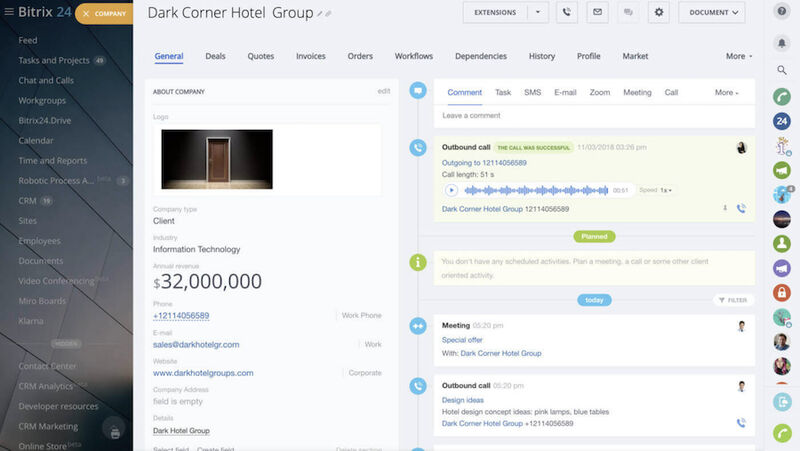
Bitrix24 customer interaction history (Source: Bitrix24)
9. Personalized Customer Service
CRMs provide your support team with consistent and real-time data on your customers, including their interactions with your sales and marketing teams. This information includes their full name, email address, birthday, and job title. Access to this information helps your support reps deliver excellent and personalized customer service.
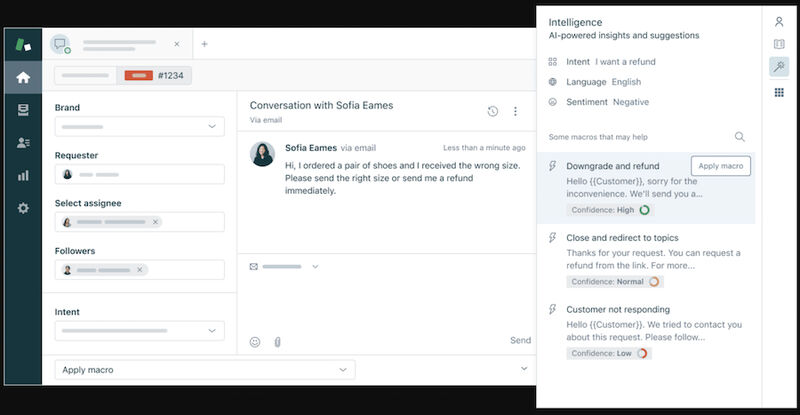
Zendesk AI-powered insights and suggestions (Source: Zendesk)
10. Faster Response Time
Each time a customer buys a product or interacts with your company, your CRM records these incidents. When a customer submits a ticket, your sales reps can quickly pull up essential customer information related to a certain ticket instead of having to repeatedly ask the customer about their concern. It allows support reps to respond to customer concerns faster and more effectively, contributing to a better customer experience and a more productive sales team.
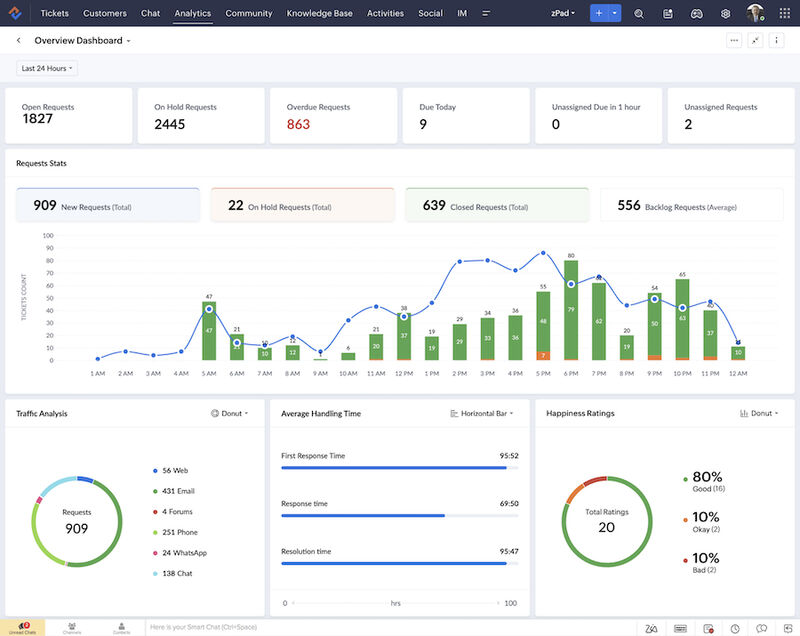
Zoho Desk analytics dashboard (Source: Zoho Desk)
11. Higher Customer Retention Rate
A CRM system helps you retain your existing customers by making sure that you don’t miss follow-up communications. It reminds you to get in touch with customers who previously purchased from you so that you can ask how they are doing. Simple follow-ups like this help keep your customers interested in your product and promote customer loyalty.
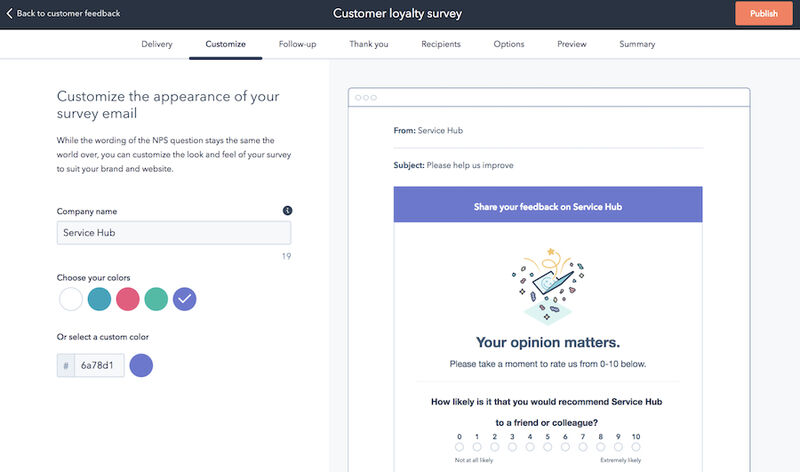
HubSpot CRM customer loyalty survey (Source: HubSpot)
Frequently Asked Questions (FAQs)
A CRM system lets employees create activity, pipeline, and task reports so that they can readily account for their daily work. They can also easily share these reports with their team leader. These are the benefits of a CRM system that helps employees save a lot of time by eliminating manual tasks. As a result, it allows them to be more productive by helping them focus on more important tasks.
A CRM system’s main objectives include creating and expanding a customer base, developing good customer relationships, and promoting customer loyalty. It helps an organization achieve these objectives by helping you manage your contacts, identify sales opportunities, manage marketing campaigns, and manage service issues all from a centralized platform.
Some of the top CRM challenges are difficulty in choosing the right provider, implementation costs, data quality issues, and getting the team to adopt a new CRM system. Users must be able to overcome these challenges to realize the benefits and advantages of CRM systems. These include simplified collaboration, better customer engagement, and higher customer retention.
Bottom Line
CRM systems help small businesses organize customer data, simplify sales and collaboration processes, and personalize customer communication. These CRM benefits extend to the sales, marketing, and support teams within your business. All the data gathered in a centralized database helps you more fully understand your customers so you can provide them with better service and improve your customer relationships.